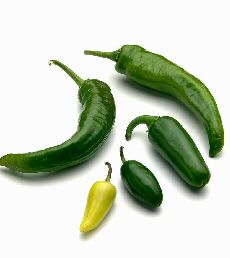 Researchers at the Cedars-Sinai Medical Center could be moving closer to a new treatment for prostate cancer using capsaicin, the compound that gives the heat to jalape�o and haba�era peppers. Capsaicin not only causes the tongue to burn, it also drives prostate cancer cells to kill themselves (known as programmed cell death or apoptosis), say the researchers, writing in the journal Cancer Research.
Researchers at the Cedars-Sinai Medical Center could be moving closer to a new treatment for prostate cancer using capsaicin, the compound that gives the heat to jalape�o and haba�era peppers. Capsaicin not only causes the tongue to burn, it also drives prostate cancer cells to kill themselves (known as programmed cell death or apoptosis), say the researchers, writing in the journal Cancer Research. In the human body, apoptosis is a normal cellular process that maintains a balance between new cells and aged or worn cells. But cancer cells seek to be immortal and often dodge apoptosis by mutating or deregulating the genes that participate in programmed cell death. For cancer researchers, finding treatments that can normalize apoptosis is a high priority, which is why the pepper finding could potentially be very important.
The researchers reported that capsaicin induced around 80 percent of prostate cancer cells growing in mice to follow the normal molecular pathways leading to apoptosis. Prostate cancer tumors treated with capsaicin were about one-fifth the size of tumors in non-treated mice. "Capsaicin had a profound anti-proliferative effect on human prostate cancer cells in culture," said researcher S�ren Lehmann at Cedars-Sinai. "It also dramatically slowed the development of prostate tumors formed by those human cell lines grown in mouse models."
He added that the dose of pepper extract fed orally to the mice was equivalent to giving 400 milligrams of capsaicin three times a week to a 200 pound man, roughly equivalent to between three and eight fresh haba�era peppers. Haba�eras, native to the Yucatan, are regarded as having the highest capsaicin content, with a rating of around 300,000 units, while the more popular Jalape�o variety contains 2,500 to 5,000 units.
In prostate cancer cells whose growth is dependent on testosterone - the predominant male sex steroid - capsaicin reduced cancer cell proliferation in a dose-dependent manner. Interestingly, prostate cancer cells that were androgen independent reacted to capsaicin in a similar manner. Capsaicin reduced the amount of androgen receptor that the tumor cells produced, but did not interfere with normal movement of androgen receptor into the nucleus of the cancer cells where the steroid receptor acts to regulate androgen target genes such as prostate specific antigen (PSA).
Capsaicin also reduced the production of PSA, a protein that often is produced in high quantities by prostate tumors and can signal the presence of prostate cancer in men. PSA levels are used as a diagnostic prostate cancer screening tool.
Based on material from the American Association for Cancer Research

